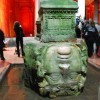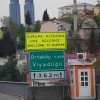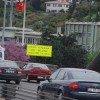(EDITOR’S NOTE: The Cleveland Foundation’s Kathleen Cerveny recently traveled to Istanbul, Turkey, as part of a contingent of Cleveland-area arts professionals. Their goal is to work with Turkish artists, teachers and others to develop arts programs for urban youth. Click here for more information.)
Two days back from the remarkable adventure that was Istanbul, I am left with these impressions:
- Popcorn clouds skimming the cables of the suspension bridge over the Bosphorus.
- Pastel houses piled high, terracing the hills like the stratified geology of the Grand Canyon.
- Satellite dishes on every balcony – sometimes two – and wash lines strung between.
- Pretzel carts on bicycle wheels like little red busses in Taksim Square.
- Narrow cobbled streets, no stop signs or speed limits, and people, cars, motorcycles, garbage trucks and trolleys all in the exact same space.
- Clean, spacious subways and jam-packed modern light rail trains.
- Motion-sensitive lights in bathrooms and electricity that shuts off in your hotel room when you leave.
- Portraits of founder of the republic, Attaturk, pointing determinedly forward.
- The heart-stopping realization of standing in the presence of history: Hagia Sophia, the Blue Mosque, the Yerebatan Cistern.
- Pomegranates spilling rubies into the streets from sidewalk fruit stands.
- Warm, welcoming people with strange names I struggle to remember.
- Teachers giving their all for disadvantaged children and knowing it’s not enough.
- Excited children extending their hands yelling “Hello, America! What is your name?!”
- Poor immigrant women proud to know they have rights in this secular society.
- Burkas, head scarves, purple hair, and bare bellies.
- Politics, religion, and politics.
Our small group* came home feeling one part excited and two parts overwhelmed by the responsibility of the project ahead. We had worked hard to learn as much as we could about the culture, history, and political and educational systems in Turkey that would either help or hinder us in sharing what we knew about working with youth through the arts. The next step is to welcome a dozen Turkish artists and educators to Cleveland in June for a month of sharing, training, and planning for an approach to out-of school-time arts programming for the marginalized immigrant youth in one of Istanbul’s poorest and largest neighborhoods.
That district, Gaziosmanpasa (GOS), has more than 1 million people from 40 different ethnic groups. The issues for children are not so much drugs and violence, we learned, but alienation from the group and pressure to leave school to work and support the family. In a secular society that places a high value on education, there is, oddly enough, no requirement to go beyond the eighth grade. Traditional expectations for girls make it very hard for them to see a future for themselves outside the home. And the pressure to succeed on standardized tests takes away any time for creative self expression.
Some teachers do their best to offer traditional arts – ethnic dance and instrumental and vocal music – but they are not trained in more modern art forms and they recognize that their students’ imaginations are underdeveloped. In high school, especially, there is no creative outlet for adolescent frustrations, or for emerging talent. In the words of the headmaster of the GOS Vocational and Technical High School: “We are losing them. We believe if we had the arts, the result would be positive. Children would be motivated to come and stay and develop self-confidence.”
Our week in Turkey was exhilarating. Now the real work begins in this daunting program to train others to replicate the successful work that Cleveland artists and arts educators are doing with urban youth.
(NOTE: Following this post are thumbnails of some photos from our trip. Click on each one to view a larger version of the image.)
* Raymond Bobgan, producing artistic director of Cleveland Public Theater; Marsha Dobrzynski, executive director of Young Audiences; Ismail Douglas, director of Motivation through Excellence, a program of the Cleveland Metropolitan School District; Tony Sias, director of arts education for the Cleveland Metropolitan School District; and Lisa Purdy, executive director of the Council of International Programs USA, headquartered in Cleveland, and project coordinator for EMY – Engaging Marginalized Youth in Turkey.









